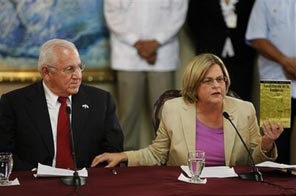Honduran leaders annul rights-limit
TEGUCIGALPA: The interim Honduran government on Monday revoked an emergency decree that prohibited large street protests and limited other civil liberties following the return of ousted Honduran President Manuel Zelaya.
The decree, which resulted in dozens of arrests and the closing of two pro-Zelaya media outlets, "has been completely revoked," Interim President Roberto Micheletti said at a news conference with U.S. Congresswoman Ileana Ros-Lehtinen, a Florida Republican.
Micheletti did not say whether the lifting of the decree would take effect immediately. He had said in a morning television interview it would be formally repealed Tuesday when the new order is published in the government's official gazette.
"Let's see if they free the campesinos and end the oppression of the people, or if this is one more trick," Zelaya told Venezuela-based television network Telesur.
Honduras' interim leaders issued the emergency order Sept. 27 in response to "calls for insurrection" by Zelaya as the ousted president sought refuge in the Brazilian Embassy after sneaking back into the country. He remains holed up in the embassy with dozens of supporters amid international diplomatic efforts to end the crisis.
The decree empowered police and soldiers to break up public meetings, arrest people without warrants and restrict the news media, with armed troops stationed throughout the capital to enforce the order.
It drew criticism even from judges and congressional leaders who backed Zelaya's ouster in a June 28 military-backed coup that was condemned by much of the rest of the world, including the U.S. government and the United Nations. Many complained the decree would disrupt campaigning for the November presidential election they hope will resolve the country's crisis.
Human rights groups have complained of unjustified arrests and the persecution of peaceful protesters, but Micheletti defended the measure to reporters as a legitimate response to an organized campaign against the government "led" by Venezuelan President Hugo Chavez.
"We've never seen scenes of burning buses and burning businesses like what has happened in recent days," he said, adding that the decision to impose the decree was "because we learned that they were planning more of this type of conduct and we weren't going to allow it."
The main effect of the order was to close down the two main pro-Zelaya media outlets, Radio Globo and Channel 36, and it blocked protest marches for several days. Zelaya supporters eventually ventured out to demonstrate, but in much smaller numbers than before.
While the decree was in force, the government also retook control of a government Agrarian Institute building that had been occupied by protesters. They detained about 55 people and lodged sedition charges against 38, who were still in custody over the weekend.
Police spokesman Orlin Cerrato said about 1,000 people were detained for violating a curfew that was imposed before the decree.
Radio Globo has been broadcasting over the Internet. The station's owner, Alejandro Villatoro, said authorities seized his station's equipment and he did not know when it would be able to resume normal operations.
Asked if the stations could now broadcast, Micheletti said they "will have to come to the courts to recover their right to be on the air."
Zelaya was forced from office with the backing of the Honduran Congress and Supreme Court for trying to hold a referendum on rewriting the constitution. His opponents charged he wanted to lift the charter's provision limiting presidents to a single term — an accusation he denies.
With the backing of much of the international community, Zelaya is seeking to be reinstated to serve out his term, which ends in January. The U.S. has suspended millions of dollars in aid to Honduras, and its ambassador has refused to meet with Micheletti, in hopes of pressuring the interim government to relinquish power.
The Organization of American States, local representatives of the Catholic Church and others have been meeting with the competing factions, seeking to negotiate an end to the standoff. But the two sides remain divided over key issues, including whether Zelaya can reassume the presidency before scheduled Nov. 29 elections.
In the television interview, Micheletti indicated he was open to Zelaya's reinstatement after the elections. But he also insisted his rival could not be president while charged with abuse of power and other so-called political crimes — and suggested the matter was out of his hands.
"In any case, it would have to be the Supreme Court that takes the decision," he said.
In response, Zelaya told reporters his "reinstatement is not negotiable." Still, he said he had "faith that this problem will be resolved soon."
Ros-Lehtinen traveled to Honduras along with two other Florida Republicans, Reps. Lincoln Mario Diaz-Balart, as part of a fact-finding trip. They are among a number of U.S. lawmakers who oppose Zelaya in large part because he is supported by Venezuela's Chavez.
The congresswoman criticized the U.S. decision to suspend aid to Honduras and revoke entry visas of officials in the interim government. She said she would urge President Barack Obama and other members of Congress to reconsider their decision not to recognize Micheletti.
"He is the president of Honduras," Ros-Lehtinen said. "Some people tell me 'de facto' government, but under the Constitution of the Republic I am seated here with the president of this country and it's a great honor."






